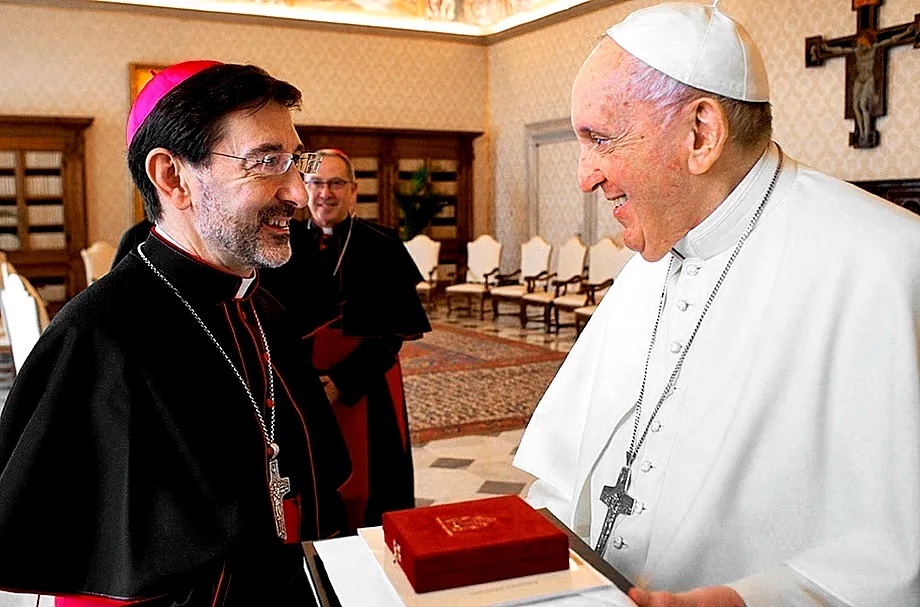Among the current Spanish cardinals, 5 could become pope and will be protagonists in the conclave: the friend of Junqueras; the chosen one by Bergoglio to align the Spanish Church with his reform; the Salesian unaligned with anyone; the self-discarded and il piccolo Ratzinger. With the picture painted, let's delve into the details.
Specifically, the one that film director Edward Berger downplayed when he put the conclave on everyone's lips: the general congregations. These are secret meetings where the 252 cardinals, whether with voting rights or not, intervene in front of the entire College of Cardinals to make their diagnosis of the situation in the Church and design the profile of the next pontiff. These meetings are decisive; in fact, Jorge Mario Bergoglio wrote down the ideas he expressed on a paper: "The Church cannot be self-referential. It has to look at the world, include, dialogue, communicate." Thus, Pope Francis called for "shepherds with the smell of sheep"; a priesthood in the streets, alongside the people.
Precisely for this reason, one of the Spanish names that resonates strongly is that of Juan José Omella (Teruel, 1946). Former President of the Spanish Episcopal Conference until last year and Archbishop of Barcelona, he is a key figure in the Spanish Church... and also in politics. Understanding of separatism and hand in hand with the very Catholic Junqueras, Omella offered to act as a mediator between La Moncloa and the Generalitat during the height of the procès. Furthermore, former President of Catalonia, Carles Puigdemont, selected him as a candidate for a mediator with the Government during the amnesty negotiations. Why? Due to his good relationship with Minister Bolaños, but also because of his intransigence with the woke ideology.
Another interesting profile that could be very influential is that of the Salesian Ángel Fernández Artime (Asturias, 1960), pro-prefect of the Dicastery for the Institutes of Consecrated Life and Societies of Apostolic Life since 2025. He coincided with Pope Francis in Buenos Aires when the latter was Cardinal Bergoglio and was one of his choices in the ninth consistory of his papacy. He is also known for his diplomatic skills in group relations, specifically for his non-aligned stance with any specific line.
In the final stretch of his papacy, Francis reinforced appointments of his own mindset. This includes Omella, but also José Cobo (Jaén, 1965), the chosen one. Bergoglio wanted the current Archbishop of Madrid and Vice President of the Spanish Episcopal Conference to align the Church in our country with the reform he initiated. Shortly after succeeding Carlos Osoro in Madrid, Pope Francis appointed him a cardinal, a full-fledged endorsement of his ecclesiastical line.
Let's take a step back: Monsignor Carlos Osoro (Cantabria, 1945) is the Archbishop Emeritus of Madrid; among the papabili, the first to receive the cardinalate from Francis in 2016. Between 2020 and 2024, he was Vice President of the Council of Cardinals, of which he is still a member. Shortly before leaving his position in this body in 2023, Osoro preceptively submitted his resignation as Archbishop of Madrid upon turning 75. Now, on the brink of 80, he rules out his own candidacy due to age reasons.
Age also seems to be a definitive handicap for the former Archbishop of Valencia Antonio Cañizares (Valencian Community, 1945) nicknamed il piccolo Ratzinger and representative of the most conservative wing of the Spanish Church. It is his stance, as well as that of many others, that sparks a debate within the Church: Should the reform initiated by Francis be protected and continued, or should the direction be shifted?
No one knows who the next pope will be; however, the decisive role of the cardinal congregations prior to the conclave is known. What the Spanish cardinals contribute to them will not be decisive for their appointment, but it will be essential to resolve a dilemma that must focus on the destiny of Francis' legacy. Ad majorem dei gloriam.
